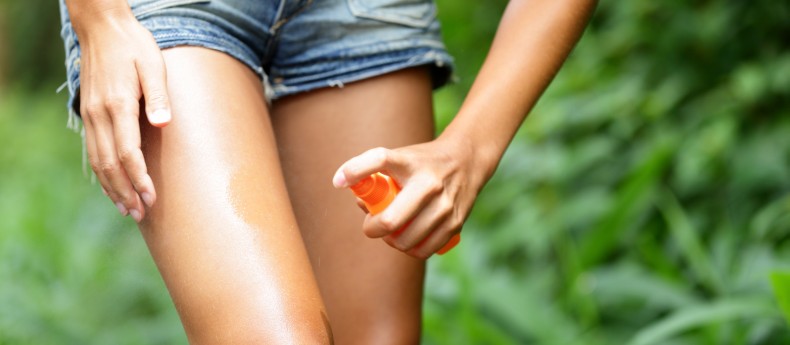
Combating Mosquitoes
That annoying buzzing in the air, that whine in your ear- it means that mosquito season is upon us once again. Find out how to avoid getting more than just irritating bites from these bloodsucking pests.
The mosquito season starts in May and runs through September each year. When we think of mosquitoes, we think of annoying, itchy bites, but the truth is that they can also transmit diseases such as Japanese encephalitis, malaria, dengue fever and West Nile virus. It is vital to protect your family and yourself from being bitten in the first place.
1. During the summer, many species of mosquitoes breed and multiply in any stagnant water that sits for more than seven days. Minimize the number of mosquitoes by reducing the amount of stagnant water around your home.
2. Restrict time spent outdoors at dusk and at dawn- these are the hours when mosquitoes that transmit the Dengue virus are the most active.
3. Be sure your door and window screens are tight-fitting and in good condition.
4. Use mosquito netting for sleeping areas for babies and small children.
5. Have mosquito or insect “zappers” handy and make sure the batteries are in good condition.
6. Always use mosquito repellent when outdoors:
- DEET (N, N-Diethyl-3-methylbenzamide) is the only proven effective chemical to combat mosquitoes. The more DEET a product contains, the longer the effect, but for most situations, 10-25% DEET is adequate for a few hours of protection.
- Re-apply after swimming, rainfall, sweating and wiping.
- DEET is safe for children and pregnant women in the 2nd and 3rd trimester.
- 7.5% DEET spray/lotion (OFF!) is available in Beijing United Family Hospital and Clinic’s pharmacy.
7. Use mosquito coils or mosquito killer electric plug-in solutions:
- The coil is an older product that is often used because it is inexpensive. Coils, however, can produce irritating fumes. The more expensive electric plug-in or liquid versions have lasting effects of 8-12 hours and are odorless.
- These products all contain pesticide chemicals (ETOC and pynamin forte) and only work in a limited space (15ft x 15ft).
8. These alternative methods may help to avoid mosquito bites:
- Use citronella candles or burn dried orange peels to produce fumes that mosquitoes hate.
- Mosquitoes do not like the smell of Vitamin B1 and B2. Try taking 2 tablets of Vitamin B complex, which may help you to repel mosquitoes through body sweat.
- Use Chinese perfume repellent like Hua Lu Shui (花露水), which also may help to repel mosquitoes by smell.
- Insect light electrocutors (bug zappers) or sound devices can reduce the number of biting mosquitoes in a limited area.
Why do mosquito bites itch?
Only female mosquitoes bite. A mosquito’s saliva has an anticoagulant that allows blood to flow easily up through its feeding tube. Proteins that are contained in the saliva and left behind in the host’s skin are what cause the skin to itch.
Despite our best efforts, anyone can get bitten by mosquitoes. The pharmacies at BJU and SHU offer a wide variety of products to relieve the itchiness caused by mosquito bites.
Over-the-counter relief
External over-the-counter products include:
- Mentholatum products (containing camphor and menthol) to relieve itching.
- Cyproheptadine cream, which belongs to the antihistamine class.
- Essential Balm or Qing Liang You (清凉油:contains menthol, camphor, peppermint oil and eucalyptus oil).
These products are safe for children but avoid applying them near the eyes or on open cuts.
Oral over-the-counter antihistamines:
- Loratadine (Clarityne) tablet or syrup. Does not cause drowsiness.
- Chlorpheniramine (Piriton or Chlortrimenton) tablets.
If itching is severe, you may need a low potency steroid cream (such as Hydrocortisone). Apply this sparingly. If the wound is infected, an antibiotic may be needed; in some cases a doctor should also be consulted.
For those traveling to or living in endemic areas, there is a very effective vaccine against Japanese Encephalitis. For those traveling to malaria endemic areas don’t forget to consult your physician in advance for malaria prevention. For more specific information and advice please consult your physician.
Copyright United Family Healthcare 2014 All right reserved - 京卫网审[2014]第1927号 - 京ICP备13017554号-4




